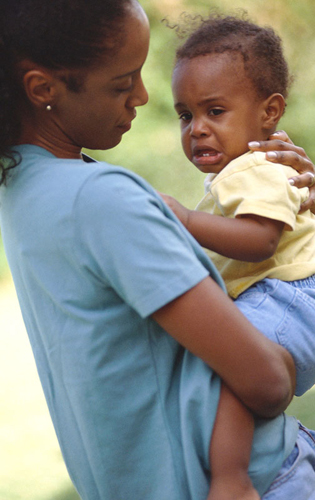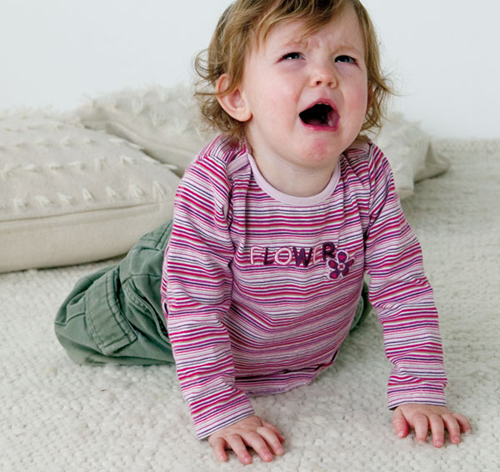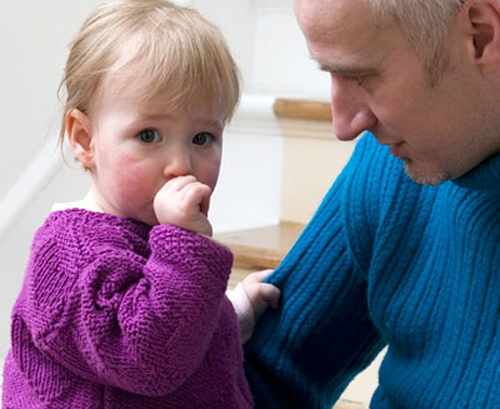| Q: |
My daughter makes us late all the time because she wants to be independent. What can we do?
| | A: |
“I do it” is your toddler’s way of telling you she is ready to be
more independent. She’s experiencing a drive to use her growing
dexterity and coordination to practice new skills and to keep trying
until she has something mastered. This is worth fostering, since her
enthusiasm to learn and try new things will be an advantage throughout
her life.
On an everyday basis,
the delays caused by her practice sessions can be frustrating, and you
may be tempted to take over. However, this may take even more time,
since you’ll have to battle her for control. Instead, try some practical
remedies, such as leaving more time for each activity. As she gets
better at each task, she’ll be quicker to complete it and there will be
less delay. You can enhance her learning by actively teaching her some
key self-help skills, such as putting her clothes on. Set up practice
sessions when there is no time pressure—weekend mornings, for instance.
Break down tasks into small steps and go through each one, telling her
what to do and guiding her physically if she needs help. A few learning
aids can help her learn—and help speed up the process. You can sew a tab
into the back of pants to help her get them on the right way, and pair
socks so she can easily pick up two that match.
|
| Q: |
How can I get my child to share?
| | A: |
Children ages two to four see themselves as the center of the
universe. Your toddler thinks everything belongs to her, and that her
needs rule the daily lives of those around her. This is a normal
egocentric stage of development, and your child finds it almost
impossible to see things from anyone else’s point of view. Being aware
of this stage can be useful in understanding her behavior. For example,
it makes sense that she is distraught when another child takes the fire
engine from her at play group, because she sees this toy as being her
own. For an adult this would be the equivalent of someone walking over
and taking your handbag or wallet or driving off with your car. You can
help her develop the social skill of sharing by praising her whenever
she does offer a toy or food to another child, but do expect this to be a
gradual learning process.
|
| Q: |
Will I spoil my toddler if I keep rewarding him for being good?
| | A: |
You can’t spoil your child by giving lots of genuine, warm praise
when he behaves well. The very best form of reward is your time and
attention, and in the early years your son will benefit from as much of
this as he can get. Through your approval he’s gaining a sense of
security, growing in confidence, and learning exactly how you want him
to behave. By contrast, frequent use of sweets or toys to reward him can
backfire, since he may come to demand material incentives for each
achievement and react by misbehaving or sulking when they aren’t
forthcoming every time. A healthy diet of praise, affection, and the
occasional treat will encourage positive behavior with no risk of
spoiling.
|
| Q: |
When our son throws a tantrum, my partner screams and shouts back. Is this a good idea?
| | A: |
Reacting emotionally to a tantrum will escalate the problem
rather than soothe it. Talk over and agree some tantrum-calming
strategies you can both use, such as staying quiet and waiting out the
storm, and speaking slowly and softly afterward. Find some time to
discuss parenting in general and how to control negative reactions. It
can help to try imagining how you’d like to be treated if you were a
small child.
If you can’t agree on these issues, ask your pediatrician about parenting classes or other services in your area.
|
| Q: |
When my child bumps into things, she smacks them and says “bad.” Why is this?
| | A: |
This interesting stage in child development, labeled “animism,”
occurs roughly from age two to seven. During this phase your child will
see inanimate objects as having life, being able to feel, react, and
act. It enables your child to find real comfort in a toy such as a
stuffed animal or doll as she can attribute emotions to that toy. It is
one way of explaining her experiences, such as bumping into things, and
it allows her to practice reactions such as scolding a “naughty” table.
This is nothing to worry about, and over the next few years her
understanding will grow, until she is able to accurately judge what is
animate and what is not.
|
| Q: |
I complain about my child, then feel guilty. Am I overreacting?
| | A: |
Talking to other adults about life with your toddler is a
positive move to offload your stresses (as long as you do it out of your
child’s earshot!). Problems occur, though, if all your stories are
unfavorable, since you may be shaping a negative view of your daughter.
Frequent horror stories of the latest tantrum in the supermarket or the
biting incident at day care mean family and friends will begin to see
her as difficult—and this label, once formed, can be hard to shift. A
negative view of your child can be self-fulfilling. If she is labeled
“naughty” then, when there is a problem, she is more likely to get the
blame whether or not she was responsible. To give everyone a balanced
view, remedy the situation by pointing out her good points and
achievements too.
|
Just a phase Bring on the tantrums
I used to feel like a
hostage to my toddler’s tantrums, always walking on eggshells to avoid
setting them off and giving in to keep him happy. After letting my son
stay up late yet again just to head off an explosion, I realized that
this needed to change. To teach him to accept the rules and routine, I
had to learn to love those tantrums, to let him show me his anger while I
stood my ground. I got through it by thinking to myself, “Bring on the
tantrum, I can cope.” Now I’m more confident, my boy knows the rules and
that no amount of fussing will make me give in.
Praise A positive development
I knew I was supposed to
praise my son but I just couldn’t find a good word to say about him. He
resisted everything from eating his breakfast to putting on his coat,
and both of us were miserable. I decided to try a praise experiment to
see if I could change things around. For one day I praised every little
thing I could think of, from getting out of bed to having one bite of
his toast.
It worked like a
charm—I had a different boy. He was smiling and seemed to do what I
asked to see if I would notice. My day was much better, and I felt
positive in myself. I’ve kept this going as well as I can. It doesn’t
always work but now I can’t imagine having nothing to praise.
NOTE
The more attention you give your toddler, the less time you’ll spend managing misbehavior
Toddler meltdowns Key tips for tantrum survival
Tantrums are embarrassing,
noisy, hard to ignore, and a normal part of your toddler’s development.
They often occur as an expression of strong emotions, when a toddler
doesn’t know how to communicate his feelings in words. You’ll notice
tantrums are often triggered by frustration, having to share, and being
told “no.” They’re more likely when your child is hungry, tired, or
overstimulated. The good news is that each tantrum gives you a chance to
teach your toddler how to handle frustration in the future. There are
ways to minimize and deal with these pint-sized explosions.
Tantrum prevention
Distraction
Redirect your child’s attention and praise him for good behavior if you see a tantrum brewing.
Timing
Hunger,
thirst, and tiredness make tantrums more likely to occur, so schedule
activities that have a high-tantrum risk when your toddler is well fed
and rested.
Once a tantrum starts
Don’t give in
If you give in or offer a treat, you’ll teach your toddler that tantrums work and he’ll be more likely to try it again.
Remove
Take the toddler out of the situation to a quiet spot, and wait for him to calm down.
Stay close
Strong emotions can be scary for your child, so stay nearby.
Stay calm
Your reaction can demonstrate that strong emotions don’t need to be overwhelming.
Stay quiet
Do not react or try to reason with your toddler until the tantrum subsides.
Following a tantrum, a mother picks up her toddler and
acknowledges his feelings of anger or frustration. This helps him begin
to label and understand his emotions.

A toddler takes the opportunity to express her emotions through a
tantrum. Most tantrums simmer down when parents stay nearby but don’t
interfere.

A father stays by his daughter while she is upset in order to
provide support. She may feel overwhelmed or afraid as she experiences
these strong new emotions.

|